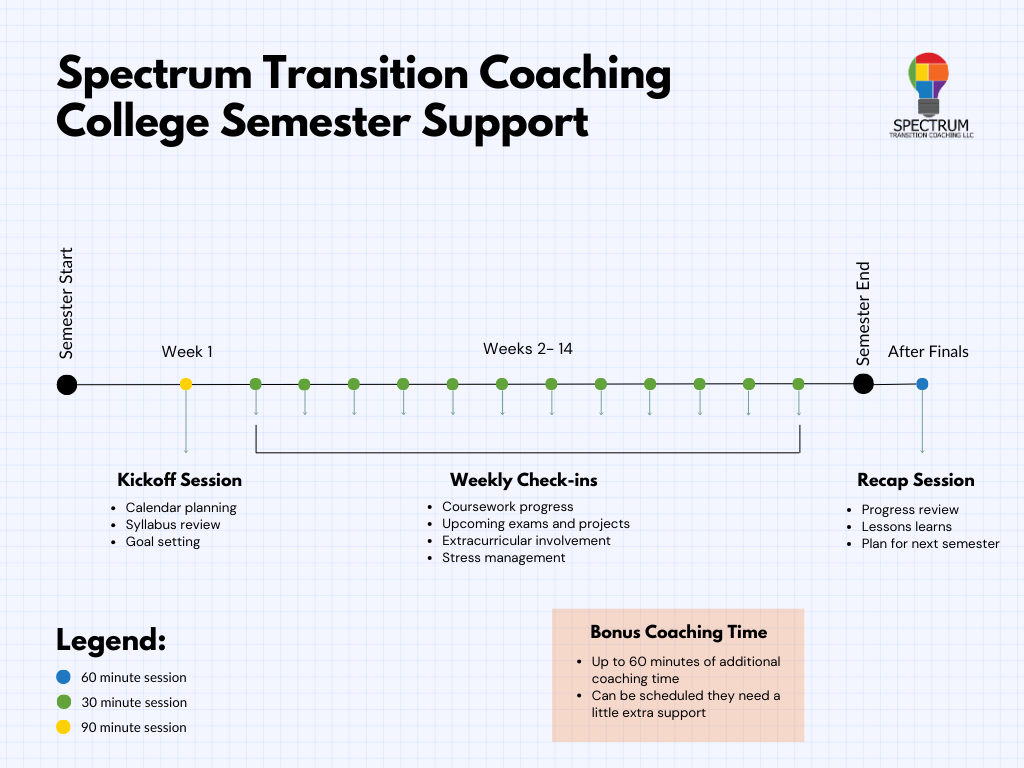College students often hear “these are the best four years of your life.” And while it’s true that being surrounded by peers with a plethora of social, extracurricular and athletic activities creates a fun environment, it is also a major life transition for young adults with autism.
College is often the first time they are living on their own, managing their time, focus, schedule and finances. Each year has it’s own set of challenges as students progress from wide-eyed freshmen to more mature seniors.
Our College Semester Support package reflects these changes with a deep understanding of the priorities and pitfalls for each year of college through the lens of autistic young adults. Learn more below!
What is the College Semester Support package?
Think of this package as an insurance policy on your tuition. Signing your student up for consistent, weekly check-ins with a coach helps them to stay accountable and on top of their coursework.
It’s much easier to stay ahead of your coursework than to catch up.
This package helps your student do just that. Here’s what’s included:
- One 90-minute session at the beginning of the semester for syllabus review and calendar planning
- Twelve 30-minute weekly check-ins help students stay organized, focused, and effective through finals
- 60 additional minutes of coaching time to be scheduled by the student when they need a little extra support or guidance
- Parent communication and updates as requested
- Priority access for additional coaching hours or parent consultations as needed

Freshman Year
In their first year, students often need help navigating a new environment. The change from high school to college is dramatic and autistic young adults may need help to find their footing with fewer supports while away from home.
Freshmen often need guidance on how to arrange for and use their academic accommodations and how to manage their time and course assignments. They may also need help navigating the various departments and offices on campuses to find professors’ office hours, mental health services and career support.
It is especially important for students to learn the rhythm of the course assignment due dates and learn to ask for help when they need it. College professors won’t extend deadlines unless the student has an accommodation, and even then, students need to ask for extra time in advance of the due date.

Sophomore Year
After a successful freshmen year, sophomore year is all about finding your social footing. Autistic young adults may feel more confident with academics and get stretched too thin or fall behind if they don’t stay on top of their coursework
Some students may be navigating Greek life which can pose a whole new set of opportunities for involvement and challenges for prioritization. Balancing social demands with course assignments presents a tough dilemma for young adults.
It is especially important for students to strike a balance between extracurriculars and academics. Whether it’s through volunteering, lab work, academics or artistic hobbies, finding those authentic friendships is a key component of campus life. At the same time, courses are getting more challenging and students may need to say no to some social opportunities in order to maintain their grades. This balance is a common topic in our College Semester Support coaching sessions with autistic sophomores.

Junior Year
In their third year on campus, junior year students may feel the pressure ramp up in academics. Most students are taking major courses at this time with increased academic stakes. GPA in your major classes may be more significant for internship and lab placements.
It is especially important for juniors to take a thoughtful approach to their summer internship application process. This is an addition to their academic and social activities and can take as much time as an additional course which makes time management and scheduling important. Many internship program applications are much earlier than students expect. Last minute deadline stress is something we try to avoid with proactive planning with our juniors.

Senior Year
As college seniors are getting ready to graduate, they will need to balance their courses, interviews and final experiences on campus. Senioritis can be real and make the spring semester especially difficult. You don’t want to get the call that your student is failing a class they need to graduate and may need summer school or an extra semester!
It is especially important for students to meet with advisors to make sure they have a clear path to graduation. Once students are entrenched in the courses for their major, they may overlook unfulfilled general education requirements.
With College Semester Support, our 12 week coaching packages help your student navigate college life with the specific challenges for their year in school.
We’re happy to chat more to ensure this is a great semester for your student!


